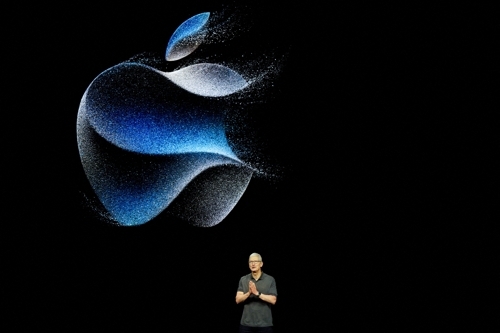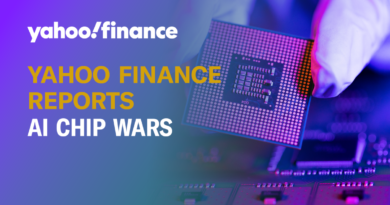Apple's reason for jumping into the development of artificial intelligence (AI) inference chips for – 매일경제
Language
Change font
A
A
A
A
Share
TOP
Most read
Language
Change font
A
A
A
A
Share
Apple’s reason for jumping into the development of artificial intelligence (AI) inference chips for data centers is not irrelevant to the “AI war” between big techs. With Microsoft (MS) and so-called “Magnificent” big tech companies, including Alphabet, Amazon, Nvidia, Tesla, and Meta, already releasing AI chips early on, Apple cannot fall behind alone. As a result, fierce competition is expected between the ‘Magnificent 7’, which even Apple participates in the war.
AI chips are essential for AI model learning and inference. In particular, AI service costs can be lowered depending on AI inference chip performance. Apple is providing various services through iCloud, so it needs its own chip before launching AI models in the future.
Apple previously installed Apple Neural Engine (ANE) that processes AI in the A-series, an application processor (AP) for iPhone, and the M-series semiconductor, a central processing unit (CPU) for Mac. In other words, they designed AI semiconductors that go into products used by consumers.
There is a separate reason for developing data center AI chips. On-device AI, which drives generative AI on smartphones and PCs, has not yet solved its practical limitations. Not only is it slow, but the performance of AI is not excellent. This is why Apple has attempted to install competitors’ products on iPhones in collaboration with Google’s “Geminai” or OpenAI’s “Chat GPT.” Both Jeminai and ChatGPT operate through AI semiconductors in the data center through the cloud.
Apple is currently focusing on “AI semiconductors for inference,” where cost and speed are important. It is intended to make it much faster and cheaper for iPhone or Mac users to use AI than other competing smartphones or PCs.
However, in the AI semiconductor market for data centers, Nvidia controls 80% of the total market and has a powerful influence.
The problem is a shortage of supplies. A few months ago, it was found that it took more than 50 weeks to order and receive an NVIDIA AI chip, H100, worth 50 million won. This is why companies such as MS, Google, and Amazon, which are customers of Nvidia and operate cloud data centers, design their own AI semiconductors. The move is aimed at reducing reliance on expensive and difficult-to-order Nvidia semiconductors and providing affordable services to customers who use their cloud services.
In this situation, if Apple makes AI semiconductors for servers, the calculation method of AI and semiconductor markets will be more complicated. Apple is likely to force the installation of AI semiconductors it designed in data centers that it uses when AI is operated in its products. If this happens, Nvidia and Big Tech will lose their market share in AI semiconductors. It is similar to Intel’s CPU sales that have decreased since Apple installed its own M semiconductor on its personal computer Mac. This is why semiconductor design companies could be hit.
On the other hand, as news spread that Apple is developing AI semiconductors on its own, interest in the impact on memory semiconductors and foundry (consignment production) is also increasing. Samsung Electronics and SK Hynix, which dominate the memory semiconductor market, can also benefit. In particular, there are expectations that demand for high value-added products such as high-bandwidth memory (HBM) and double data generator 5 (DDR5) will surge.
“Even if Apple develops AI chips, only Korea and Taiwan have the ability to produce them,” said Ahn Ki-hyun, executive director of the Semiconductor Association. “In the end, there will be a positive impact on the Korean semiconductor industry because there will be many AI chip customers.”
The foundry industry also expected to benefit. An industry official expected, “Samsung Electronics and Taiwan’s TSMC can take a chance over the foundation.” According to Gartner, the AI semiconductor market is expected to grow from $53.4 billion last year to $67.1 billion this year and is estimated to reach $119.4 billion by 2027.
Some predict that if the supply shortage is resolved, domestic IT companies, including Naver and Kakao, will purchase AI chips at a lower price to speed up AI development. “The more companies develop AI chips, the lower the price will be,” executive director Ahn said. “For Naver and Kakao, which need AI chips, it is positive that Nvidia’s monopoly is resolved.”
Currently, major tech companies around the world are designing their own AI semiconductors for the growing AI market. However, each company has a different purpose of making it. Companies such as MS, Google, and Amazon have a great purpose of learning AI on their own, as well as providing cloud services to customers using AI. On the other hand, Meta created AI semiconductors for its own AI learning and internal use. Tesla also developed Dojo D1 semiconductors to learn autonomous vehicles.
Traditional semiconductor companies such as Nvidia, Intel, and AMD are making AI semiconductors for sale to data centers. Since big tech companies are the biggest customers, sales will decrease if they make AI semiconductors themselves. The AI semiconductor Mach-1, which is being made by Samsung Electronics Korea, must also be sold to companies operating data centers.
2024-07-11 21:37:31
2024-07-12 17:19:59
2024-07-12 09:58:50
2024-07-12 17:47:03
2024-07-11 23:42:26
2024-07-12 16:22:29
2024-07-12 17:05:18
2024-07-12 16:06:28
2024-07-12 16:28:09
2024-07-12 16:10:22
※ This service is provided by machine translation tool, NAVER papago.
Maeil Business Newpaper(MK) provides these translations “as they are” and makes no warranties of any kind, either explicitly or implicitly, regarding accuracy, reliability and marketability, suitability for a particular purpose, etc. of translation. Please be informed that the content provided may not be translated accurately due to limitations in machine translation before using this service.
Copyright (c) 매경닷컴. Maeil Business News Korea & mk.co.kr, All rights reserved.
Prohibition of unauthorized reproduction, redistribution, and use of AI learning


